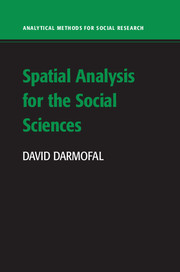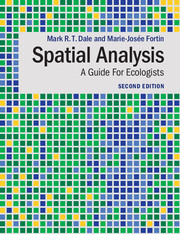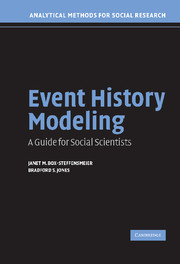Spatial Analysis for the Social Sciences
Part of Analytical Methods for Social Research
- Author: David Darmofal, University of South Carolina
- Date Published: October 2015
- availability: In stock
- format: Paperback
- isbn: 9780521716383
Paperback
Other available formats:
Hardback, eBook
Looking for an inspection copy?
This title is not currently available on inspection
-
Many theories in the social sciences predict spatial dependence or the similarity of behaviors at neighboring locations. Spatial Analysis for the Social Sciences demonstrates how researchers can diagnose and model this spatial dependence and draw more valid inferences as a result. The book is structured around the well-known Galton's problem and presents a step-by-step guide to the application of spatial analysis. The book examines a variety of spatial diagnostics and models through a series of applied examples drawn from the social sciences. These include spatial lag models that capture behavioral diffusion between actors, spatial error models that account for spatial dependence in errors, and models that incorporate spatial heterogeneity in the effects of covariates. Spatial Analysis for the Social Sciences also examines advanced spatial models for time-series cross-sectional data, categorical and limited dependent variables, count data, and survival data.
Read more- Demonstrates how to apply spatial analysis for applied researchers in the social sciences
- Written in a user-friendly manner, the book can be easily understood and applied
- Illustrates the application of spatial analysis via examples, with data and code for them provided online for researchers
Reviews & endorsements
'Do you collect all your data from just one place? Would the geography of what your research covers look like a single dot on a map? If so, then don't read David Darmofal's interesting and accessible book on spatial statistics. And definitely skip the practical discussion of software that shows you how to improve your statistical analyses to account for geographic dependencies.' Gary King, Albert J. Weatherhead III University Professor, and Director, Institute for Quantitative Social Science, Harvard University, Massachusetts
See more reviews'Spatial Analysis for the Social Sciences is an accessible 'must-read' so that scholars learn to recognize the dependencies in their data, how to test for these dependencies, and how to address them. Darmofal is convincing in his conclusion that all social science data are indeed spatial data.' Janet M. Box-Steffensmeier, Vernal Riffe Professor of Political Science, Ohio State University
'In this detailed, thoughtful book, David Darmofal teaches us how to model data driven by geography, whether cholera outbreaks or presidential votes. This book maps out strategies to define spatial data and draw inferences. His work is thorough, his treatment of the subject is masterful, and students across the social sciences will benefit from this book. This is an exciting read for a methodologically sophisticated reader, providing fantastic illustrations.' Betsy Sinclair, Washington University, St Louis
Customer reviews
Not yet reviewed
Be the first to review
Review was not posted due to profanity
×Product details
- Date Published: October 2015
- format: Paperback
- isbn: 9780521716383
- length: 259 pages
- dimensions: 229 x 152 x 15 mm
- weight: 0.39kg
- contains: 16 b/w illus. 27 tables
- availability: In stock
Table of Contents
Part I. General Topics:
1. The social sciences and spatial analysis
2. Defining neighbors via a spatial weights matrix
3. Spatial autocorrelation and statistical inference
4. Diagnosing spatial dependence
5. Diagnosing spatial dependence in the presence of covariates
6. Spatial lag and spatial error models
7. Spatial heterogeneity
Part II. Advanced Topics:
8. Time-series-cross-section (TSCS) and panel data models
9. Advanced spatial models
10. Conclusion
Part III. Appendices on Implementing Spatial Analyses:
11. Getting data ready for a spatial analysis
12. Spatial software
13. Web resources for spatial analysis
14. Glossary.
Sorry, this resource is locked
Please register or sign in to request access. If you are having problems accessing these resources please email lecturers@cambridge.org
Register Sign in» Proceed
You are now leaving the Cambridge University Press website. Your eBook purchase and download will be completed by our partner www.ebooks.com. Please see the permission section of the www.ebooks.com catalogue page for details of the print & copy limits on our eBooks.
Continue ×Are you sure you want to delete your account?
This cannot be undone.
Thank you for your feedback which will help us improve our service.
If you requested a response, we will make sure to get back to you shortly.
×





